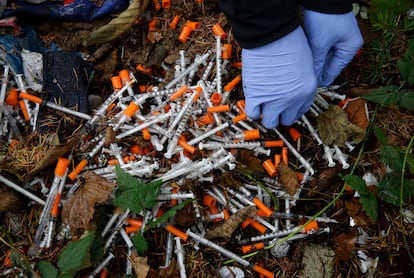Oregon’s drug decriminalization: Why are lawmakers reconsidering the divisive strategy
The radical approach has been described as a failure as deaths by overdose have increased. However, some think the law was not implemented properly
In 2020, Oregon voters passed Measure 110, which decriminalized the possession of small amounts of illegal drugs and directed cannabis taxes money towards recovery services for addicts. The measure’s goal was to change the approach towards drug use by treating addiction as a public health matter. Although it seemed radical, it was an example of a city seeking a different solution to the current drug crisis America is facing; which in Portland, precisely, has led to the declaration of 90-day State of Emergency since February 1st.
Portugal implemented a similar approach at the beginning of the century. The country decriminalized the possession and use of small amounts of drugs for personal use. Instead, it considers them administrative offenses, not criminal, and it focuses on health and harm reduction by offering addicts treatment, counseling and other health services rather than being sent to jail. The policy has been considered successful by reducing not only drug-related deaths but HIV/AIDS transmission rates, and drug-related crime.
Under Measure 110, drug users are issued $100 citations with a card that includes the number to a hotline for addiction treatment services. They can call the hotline to help dismiss the citation. However, there are no consequences if they ignore the citations, and only a very small percentage of people call the hotline. According to state auditors, only 1% who received citations called. This has resulted in a sharp rise in overdose deaths linked to drug use, particularly use of fentanyl, which has caused Oregon lawmakers to consider backtracking on the measure.

Where it went wrong?
An analysis on the effectiveness of Measure 110 published by Tony Schick and Conrad Wilson of Oregon Public Broadcasting say that “political leaders played central roles in failing to deliver on the potential for law enforcement to connect people with lifesaving services”. According to the paper, the government failed to train police on how to better use the new law. The report highlights that Tera Hurst, a supporter of Measure 110, of Oregon’s Health Justice Recovery Alliance, proposed a detailed plan for its implementation to Governor Kate Brown’s office three days before the measure became effective in February 2021.
The plan included actions such as issuing bulletins to police departments, creating specialized tickets for drug possession with treatment information, and coordinating with hotline operators for treatment notifications. However, none of these proposals were executed, and police continued using old citations without treatment information. Despite Hurst’s persistent efforts, Governor Brown’s office did not convene a collaborative group or provide clear directives to law enforcement on implementing the law. Although the governor mentioned exploring options such as new police training, no specific instructions were provided by the Department of Public Safety Standards and Training or the Oregon Health Authority. Brown acknowledged the challenges in the rollout of Measure 110 but cited limitations on her administration’s options when it took effect in 2021.
Despite this the law has made significant progress by allocating $265 million of cannabis tax revenue towards establishing Oregon’s new addiction treatment infrastructure. It has established Behavioral Health Resource Networks in each county, providing care regardless of financial capability. State data indicates that approximately 7,000 individuals entered treatment between January and March 2024, doubling from the previous quarter. This funding has also provided stability and predictability for mental health and addiction service providers, offering a sustainable source of funding that was previously lacking, according to Heather Jefferis, Executive Director of the Oregon Council for Behavioral Health.

Proposals
Republican lawmakers have asked Democratic Gov. Tina Kotek to convene a special session during the February Legislature. They are looking for stricter penalties for drug possession (up to a year of prison) and related offenses, including mandatory treatment, and easing restrictions to allow the placement of users under the influence in facilities like hospitals if they present a risk to themselves or others.
Meanwhile, the Democrat majority is pushing for a bill to make small-scale drug possession a low-level misdemeanor. Offenders would face a maximum of 30 days in jail but would have the option to pursue treatment rather than facing charges. The bill would also increase sentences for drug dealers, widen access to medication for opioid addiction treatment, and drug prevention programs that include expanded recovery and housing services.
Lawmakers will vote on re-criminalization during the current session.
Sign up for our weekly newsletter to get more English-language news coverage from EL PAÍS USA Edition
Tu suscripción se está usando en otro dispositivo
¿Quieres añadir otro usuario a tu suscripción?
Si continúas leyendo en este dispositivo, no se podrá leer en el otro.
FlechaTu suscripción se está usando en otro dispositivo y solo puedes acceder a EL PAÍS desde un dispositivo a la vez.
Si quieres compartir tu cuenta, cambia tu suscripción a la modalidad Premium, así podrás añadir otro usuario. Cada uno accederá con su propia cuenta de email, lo que os permitirá personalizar vuestra experiencia en EL PAÍS.
¿Tienes una suscripción de empresa? Accede aquí para contratar más cuentas.
En el caso de no saber quién está usando tu cuenta, te recomendamos cambiar tu contraseña aquí.
Si decides continuar compartiendo tu cuenta, este mensaje se mostrará en tu dispositivo y en el de la otra persona que está usando tu cuenta de forma indefinida, afectando a tu experiencia de lectura. Puedes consultar aquí los términos y condiciones de la suscripción digital.









































